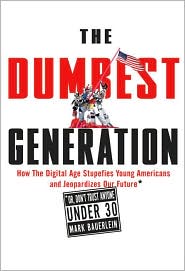Although always intrigued by bombastically titled books, I generally find myself discouraged by their poor argumentation, weak research, or overzealous rhetoric. Not this one. (I did however feel somewhat self-conscious requesting the title at the local bookstore; the guy looked at me as if I had requested a book on how to join the KKK. Sigh.) Unfortunately, I simply don’t have enough time to give this 230 page pearl justice in terms of a review (especially with a certain 2 year old sitting in my lap). All I can briefly say is: smart, smart, smart — the thinking, diction, argumentation, research — all of it. Bauerlein, an English professor at Emory, fluidly moves through vast amounts of research (15 pg. bibliography) to debunk the myth that the technology age has in fact increased the intellects of the under 30s.
While giving credence to all his counter-arguments, Bauerlein quickly points out that in spite of the increased availability of vast amounts of information and the ability to connect to the thoughts and achievements of the generations preceding us (“vertical modeling”), the under-30 crowd (just missed that one) still primarily uses the Web for what he terms “horizontal modeling” or “more raillery and mimicry of people the same age.” So, rather than connecting youth to the wisdom, traditions, or lessons of the past, the Web is creating a generational cocoon, allowing adolescents more advanced means “to do what they’ve always done in a prosperous time: talk to, act like, think like, compete against, and play with one another.” This cocoon simultaneously misleads them to believe that “authentic reality begins with themselves and that what preceded them is irrelevant.” Hence we experience the currently more common “trumpeting [of] a-literacy (the knowing how to read, but choosing not to)” as well as the glorification of the “perpetual adolescent” — an extension of the adolescent interests and demeanors well into adulthood. Adolescence, Bauerlein describes, originally was intended as a brief segue into adulthood and has since become a widely accepted extended phase of self-exploration lasting well into our 20s (or even 30s).
With all of his dower statistics and prophecies, Bauerlein does not actually blame the millennial generation or technology per se. He, however, does turn to admonish the mentors (both formal and informal educators) for our deferment of educational leadership to technology (i.e. hours of approved “screen time,” glorification of “electronic-literacy” as a replacement for traditional literacy, ignorant assumptions and interpretations of statistics…etc). Overall, Baurlein seems primarily concerned with the declining general intellect of the young population in relation to the direction of national leadership and intellectual competition with rising world powers. Pretentious title aside, the book is certainly worth your time.





Comments
This sounds so interesting! I am not an educator but I have often wondered how technology may affect their ability to write. If they are always texting shortened versions of words will they be able to intelligably write something? And I know it bothered my grandmother (she was a teacher) that no one really uses cursive anymore (me included unfortunately). Anyways, I will definitely have to pick that one up. Thanks for the review, Bethany.
Will READ. I have so many thoughts on these issues. Being an educator, and specifically an educator to students who are constantly wanting to be entertained… I am curious about this read. There is pressure in the public school system to cater more than ever to students needs (i.e. to be powered up at school). Certain pools of educators feel that when students come to school they “power down” after spending so much time on electronic devices in their free time. It is frightening for me, as an educator, to think of this being the case but my instincts tell me it is true. But the question I am left with is always… though it is the way of our world at the moment, shouldn’t there come a point when we re-educate students (and ourselves) about learning in ways that have proven true through centuries. Anyways, the point is, will read, sounds incredibly relevant to parents and educators.
Sound like a great read. I’ve read some articles along the lines of “Is google making us stupid.” This is def. something I see in my students. I am not using powerpoint presentations this semester (mainly b/c it was too much work) and I feel like I have been able to be more engaging in lectures. But it may have a positive effect in requiring students to read the text and/or communicate with class mates if they miss a day. I think the key is using things like facebook to somehow increase real world interaction instead of decrease it. And how to get students to read? That’s a good question…
So is he defining adolescence as characterized primarily by self-exploration? Does he address the transition to adulthood and, if so, how does he cast it?